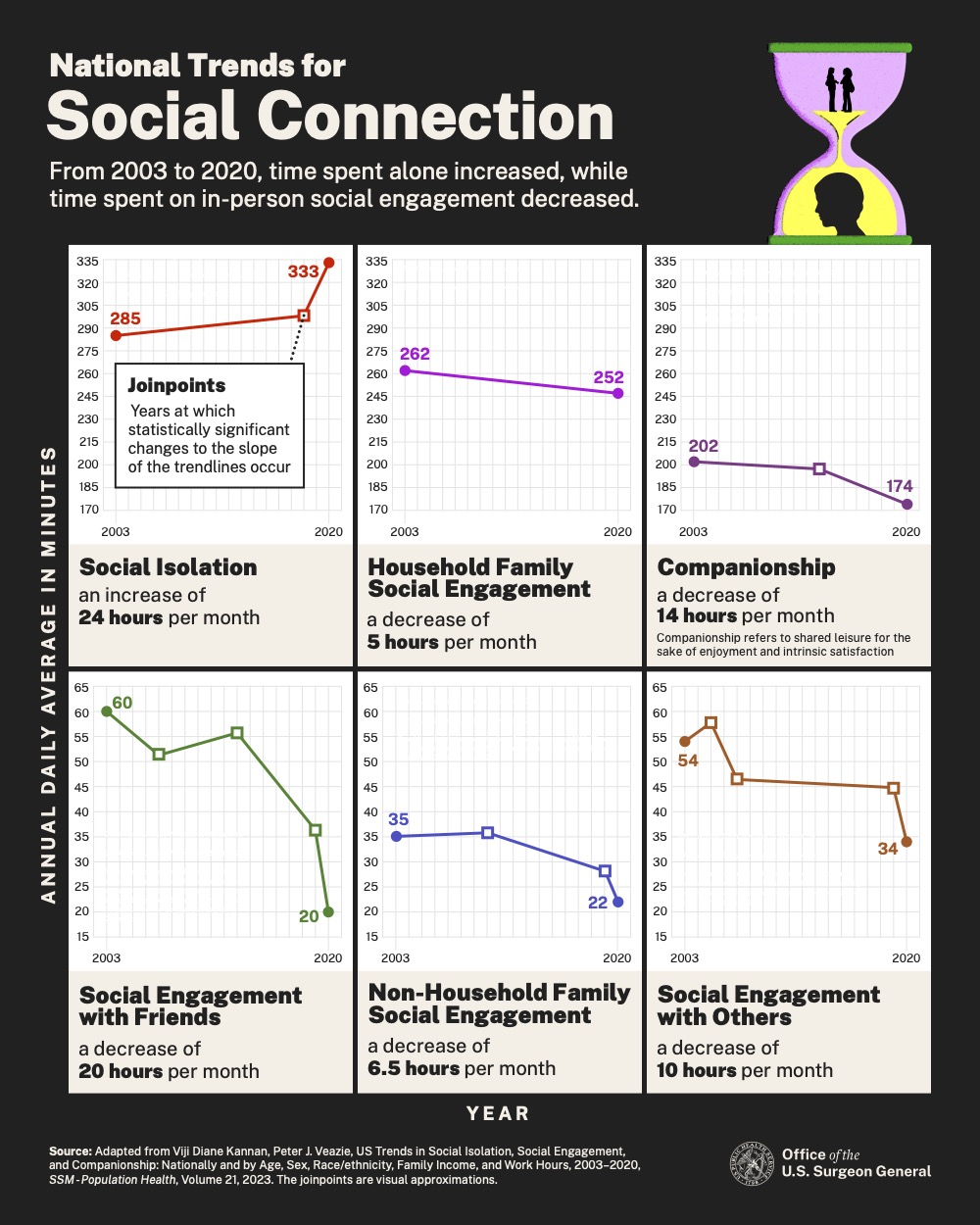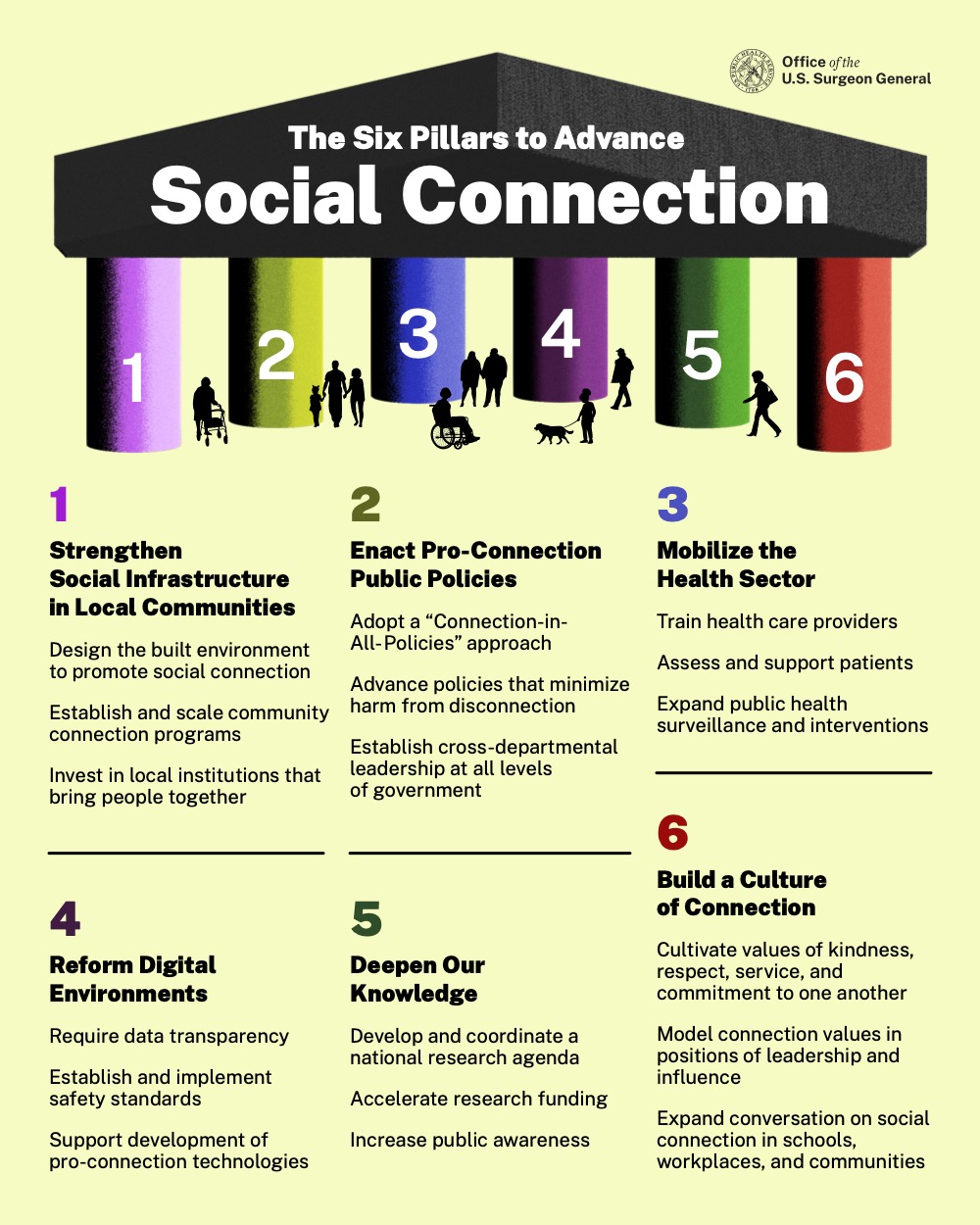Earlier this year, U.S. Surgeon General Dr. Vivek Murthy released a report highlighting how integral social connection is to our health, safety, prosperity, and overall wellbeing. This advisory puts forth a vision for making relationships a national priority and provides a blueprint for strengthening our social fabric.
The report, titled "Our Epidemic of Loneliness and Isolation: The Surgeon General's Advisory on the Healing Effects of Social Connection and Community" makes a powerful statement upfront that relationships are just as vital to human life as our basic needs:
"Relationships are just as essential to our survival as food and water."
It explains that throughout human history, back to prehistoric times, we have fundamentally relied on social groups for our very survival. Even now in modern times, our brains are still wired to crave proximity and connection with others. This remains an innate biological imperative.
The Loneliness Epidemic Represents a Profound Public Health Crisis
Shockingly, the report reveals that nearly 50% of American adults—a staggering 110 million people—say they feel lonely* Compared to rates of smoking, obesity and other major health issues, this loneliness epidemic poses severe risks:
- Those lacking social connections face a 50% increased risk of dying prematurely—a mortality effect equivalent to smoking up to 15 cigarettes per day. This represents over 2.5 million deaths each year attributable to loneliness.
- Loneliness and isolation dramatically raise the risks of heart disease, stroke, dementia, depression, anxiety, and suicide. This accounts for increased healthcare spending of over $6 billion annually just for older adults.
During COVID-19, our awareness of social disconnection as a critical public health threat was thrust into public consciousness in a new way. Over 1 in 4 Americans said they felt less close to family and friends after the pandemic began. This underscores the urgent need to take bold action to address this crisis.
How Social Connection Profoundly Improves Our Health
Critically, the Surgeon General's report comprehensively delineates how greater social connection enhances health through three key pathways with concrete examples:
Biologically
- Reduces destructive stress hormones like cortisol
- Lowers systemic inflammation involved in chronic diseases
- Enhances appropriate immune responses to infections
- Optimizes regulation of neuroendocrine systems
Psychologically
- Provides meaning, purpose, agency, self-worth and will to live
- Builds resilience to manage life's hardships
- Suppresses perceptions of fear, threat and isolation
Behaviorally
- Facilitates adherence to positive health behaviors like exercise, sleep, medication
- Discourages substance misuse, self-harm, violence and risk-taking
- Improves access to health information and services

Community Connection Is Integral to Collective Wellbeing
Beyond individual health outcomes, social connection is a pivotal determinant of overall public health, safety, economic prosperity, and community resilience. Studies demonstrate that localities with higher levels of social trust, civic participation and cohesion gain substantial benefits including:
- Better population health and life expectancy
- Robust economic growth and equity
- Enhanced safety from crime and violence
- Greater preparation and recovery from natural disasters
However, forms of civic engagement and community attachment have steadily declined over recent decades, contributing to a nationwide crisis of connection with cascading effects. Reversing this fraying social fabric is an urgent call to action.
A National Strategy is Imperative to Restore Social Bonds
To reverse the alarming declines in social connection, the Surgeon General puts forth a comprehensive National Strategy*founded on six interdependent pillars that must work in tandem:
- Invest heavily in social infrastructure at the local level
- Enact pro-connection public policies across all sectors
- Mobilize health care systems to assess and address social needs
- Reform digital environments to favor true human connection
- Prioritize research funding and coordination significantly
- Cultivate cultural values of mutual care, service and solidarity
This National Strategy includes detailed recommendations for various stakeholders, from government agencies to schools, health care systems, businesses, faith communities, technology companies and more to make strengthening relationships a top priority.
It also issues a clarion call to individuals to reflect on our own social habits and take action through small steps that uplift others. Each of us can start now by reaching out to people in our lives, being responsive and supportive, practicing empathy and gratitude, and engaging civically.

-
This landmark report from the nation's top public health official makes a compelling moral case that social connection is just as essential to our collective survival and prosperity as the air we breathe and food we eat.
Our future depends on the bold steps we take today to heal divisions, nurture relationships, rebuild declining community structures, and catalyze cultural change that honors our human need for connection.
The extensive evidence and urgent call to action in this historic Surgeon General's advisory can serve as a turning point to drive societal transformation that elevates our social bonds to their rightful status as a public health priority. The thriving, just and resilient society we desire is within reach if we fully embrace this vision.